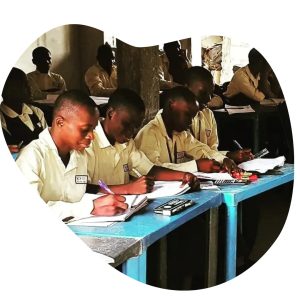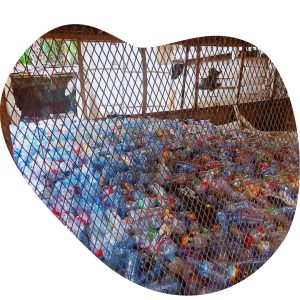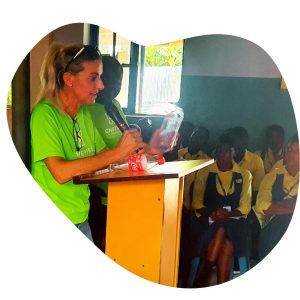Nowadays, when the global environmental crisis is gaining momentum, it is increasingly important for non-profit organizations to actively cooperate in solving environmental problems. Concerns about environmental sustainability are constantly growing, so it is imperative that we actively engage in initiatives that promote environmental awareness. One of the areas where we can play a key role is involvement in the so-called green projects. Within them, cooperation with companies that deal with environmental problems and try to solve them is important.
we actively engage in initiatives that promote environmental awareness. One of the areas where we can play a key role is involvement in the so-called green projects. Within them, cooperation with companies that deal with environmental problems and try to solve them is important.
During the three years of our activity, our non-profit organization has undergone development, when we came to the conclusion that green education is one of the most important activities that we want to devote ourselves to. This issue interested us so much that we decided to cooperate on a green project with the company DUKATY property, s.r.o., http://www.dukaty.sk, which is dedicated to the collection of plastics and plastic waste in Nigeria in cooperation with the Ministry of Foreign Affairs of the Slovak republic http://www.slovakaid.sk. The reason is simple, as such activities not only contribute to the protection of the environment, but also open the door for us to educate children and youth and raise funds for our other non-profit activities. So let’s talk a little more about this initiative.
Non-profit organizations play a fundamental role in educating the younger generation about the importance of environmental protection. By participating in the green project of plastic collection, we have the opportunity to actively involve children and youth in environmental  activities, to pass on knowledge about waste management, recycling and sustainable practices. Here are some of the ways the project supports education:
activities, to pass on knowledge about waste management, recycling and sustainable practices. Here are some of the ways the project supports education:
a. Practical learning: Participation in the project allows children and young people to see firsthand how plastic waste negatively affects the environment. They learn the importance of properly sorting and recycling plastic waste, as well as promoting a sense of responsibility and caring for the environment.
b. Educational campaigns: the organization of educational campaigns, workshops and educational events aim to inform children and young people about plastic pollution and its consequences for our planet. This knowledge motivates them to take concrete steps in reducing plastic consumption and promoting recycling.
c. Collaborative learning: the green project offers us opportunities to work with schools, colleges and youth groups, promoting a sense of  teamwork and social responsibility. Building partnerships to solve environmental problems also strengthens community ties and supports collective efforts for a greener future.
teamwork and social responsibility. Building partnerships to solve environmental problems also strengthens community ties and supports collective efforts for a greener future.
Fundraising is a key aspect of non-profit organizations as it allows us to continue our work and make a positive contribution to society. Joining a green plastic collection project is an opportunity to generate funds in a sustainable way.
Non-profit organizations like ours, we are looking for sponsorship and trying to create partnerships with companies and corporations that are willing to support green initiatives. That is also why in 2021 we entered into a partner project with the company DUKATY property, s.r.o., which in 2021 started actively working on the project called „Nigeria clean & green“, where as part of its activity it created the so-called Collection Spot, CoSpot for short, that is, a place for collecting plastic waste https://dukaty.sk/ako-to-funguje/. We joined this green cooperation by creating smaller collection points  in schools in Nigeria. Here, children and students have the opportunity to bring plastic bottles, for which they are rewarded. We will talk about the operation of the project in more detail in the next article.
in schools in Nigeria. Here, children and students have the opportunity to bring plastic bottles, for which they are rewarded. We will talk about the operation of the project in more detail in the next article.
Within such and similar collaborations, companies can contribute know-how as well as provide financial support or contribute resources and infrastructure for the collection and recycling of plastics, thus ensuring the success of the project.
With a green project like ours, non-profit organizations can also approach individuals, philanthropic foundations or government entities for donations and grants specifically aimed at environmental sustainability. If you know of someone who would like to support our activities, let them know, we will look forward to such cooperation. It is very important to expand our initiatives and for this we need your support, link for more information: https://www.onetribe.foundation/darujte/
In the future, we have plans to present our goals and the message of the project at ecological fundraising events. And we would also like to organize other activities to support our green project, such as environmental walks, sports events, up to auctions with the theme of recycling. These events not only raise funds, but also spread awareness and encourage public participation in environmental actions. In a country like Nigeria, this will be an extremely difficult challenge, but with the help of state bodies such as Ministry of the Environment, we believe that these activities will become popular and especially effective in the fight against country pollution.
In conclusion, I want to emphasize that the involvement and cooperation of non-profit organizations in green projects like ours is of great importance, especially from the point of view of education. We can say that, especially in Africa, non-profit organizations with their active participation take on the role of environmental educators who give children and youth knowledge and instill a sense of responsibility. In addition, their involvement in the project paves the way for sustainable fundraising, enabling the continuation of their green charity activities. ONETRIBE FOUNDATION actively contributes to the creation of a sustainable future with its activities, and our activities will forever leave a positive legacy for the following generations.
importance, especially from the point of view of education. We can say that, especially in Africa, non-profit organizations with their active participation take on the role of environmental educators who give children and youth knowledge and instill a sense of responsibility. In addition, their involvement in the project paves the way for sustainable fundraising, enabling the continuation of their green charity activities. ONETRIBE FOUNDATION actively contributes to the creation of a sustainable future with its activities, and our activities will forever leave a positive legacy for the following generations.
Our green project of plastic collection and the creation of the so-called CoSpots, collection spots and our educational activities, we are moving us closer to a greener and more sustainable future for everyone.